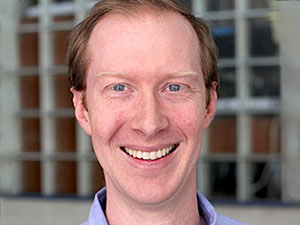Sixteen years ago, Jason Hill stood before some 30 students in one of his first classes as a teaching assistant at the University of Minnesota. This June, more than 14,000 students will log on to take his course, Sustainability of Food Systems: A Global Life Cycle Perspective.
Hill’s class is among the first five massive open online courses (MOOCs) the U of M is offering (for free) through a partnership with Coursera, a leading MOOC platform.
The fact that thousands of people from dozens of countries have registered for the class is amazing to Hill, a McKnight Land-Grant Professor in the College of Food, Agricultural and Natural Resource Sciences (CFANS).
“Back when I was a teaching assistant I never imagined that I would one day be teaching 10,000 students in one class,” Hill says.

Jason Hill’s class is among the first five massive open online courses (MOOCs) the U of M is offering through a partnership with Coursera. Image credit: University of Minnesota
The course’s popularity reflects the surge of interest in food systems and the challenges society will face in meeting increasing food demand in a sustainable way as the world’s population swells to 9 billion by 2050.
The class is designed for anyone from the small-town grocer in Minnesota and the retiree in California to the architect in Australia and the student in Zimbabwe. There are no prerequisites.
“You just need to have a basic knowledge of food—which we all know something about,” Hill says.
The course gives the University an opportunity to showcase the breadth and depth of experts in topics related to food at the U of M.
“Experts in [CFANS] and the University cover everything from how we grow and process food to the environmental and health impacts of food,” Hill says. “We have it all. This is the place to study food.”
Hill agreed to teach the MOOC in January. With such a brief amount of time to construct a class, Hill called on research associate Kimberley Mullins to work with him. Mullins’ background centers on renewable energy and biofuels, but she jumped at the chance to work on the food systems MOOC.
But Hill and Mullins knew they would need to adapt the teaching to fit the supersized class and diversity of students.
“I’ve had to think a lot about how we can take what is an online, yet very personal course to a global audience, yet not lose the personal interaction,” Hill says.
Making MOOCs palatable
MOOCs often involve an information dump with talking heads and PowerPoint slides or what is referred to as “the sage on the stage,” says Jay Bell, CFANS associate dean.
“We know if you want students to learn, they have to become engaged in the information as opposed to being told the information,” Bell says.
Hill will serve up a more palatable class by ditching the idea of solo lectures and replacing them with engaging discussions. U of M experts in a variety of fields relating to food systems will join Hill in video recorded discussions that students can view at whatever time they choose.
The class is organized around 15 questions about the world’s food system, and video discussions will focus on those questions. Once students watch the videos, they will enter online forums where they will discuss the topics and readings. Students also will take quizzes to test their comprehension.
The Coursera platform offers further tools for student feedback. For example, students can “vote” for or recommend comments they think their classmates should read. And, if there is a topic or question students want Hill and his team to answer, they can also promote those.
Mullins and Hill want the class environment they create to foster fruitful discussions among students who hold differing viewpoints, experiences, and understanding.
They want students to come away with a broader appreciation of the global food system and how everyone’s choices affect its sustainability, but they also want to promote critical thinking and learning from one’s peers—the world over.
“If the class has read a paper about the food system in Afghanistan, maybe there’s someone from Afghanistan or a nearby nation in the class who can teach us more about it,” Hill says.
Mullins relishes the opportunity to be among the educators involved in this new educational landscape.
“It’s really exciting for me,” Mullins says. “There’s not a long track record—there’s no best practices for MOOCs yet. We’re at that really fun—and terrifying—frontier.”
Right now, the class isn’t being offered for credit, but that possibility will be explored for the future. MOOCs are just one piece of the overall learning experience for college students, Hill says.
“You still need in-class, face-to-face interaction and experiential learning,” he says.
*Source: University of Minnesota
